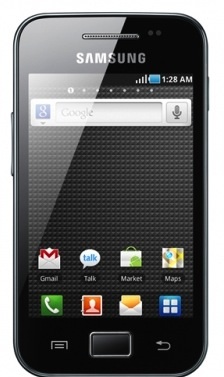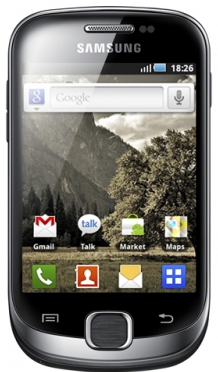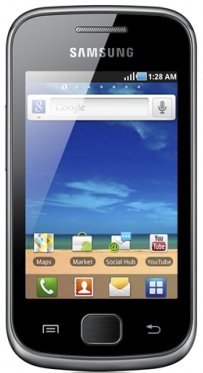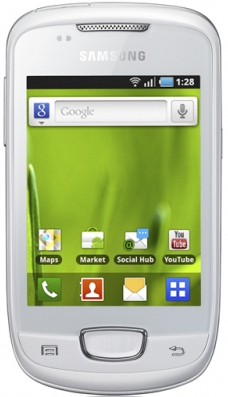Four mid-range Samsung Android phones extend Galaxy line
Jan 27, 2011 — by LinuxDevices Staff — from the LinuxDevices Archive — 1 viewsSamsung has announced four new Galaxy-branded, mid-range Android 2.2 smartphones, heading first to Russia. The new line-up includes the 3.5-inch, 800MHz Ace, the 3.3-inch, 600MHz Fit, the 3.2-inch, 800MHz Gio, and the 3.1-inch 600MHz Mini, says the company.
Samsung is apparently planning world domination. Or more exactly — following swift sales of 10 million Galaxy S smartphones and more than a million Galaxy Tab tablets — the company will launch four, Android-based Galaxy S phones: the Ace, Fit, Gio and Mini.
Geared toward first-time smartphone owners, the devices take their design cues from the original Galaxy S phones, such as the Verizon Fascinate, T-Mobile Vibrant, and Sprint's Samsung Epic 4G, says Samsung. The phones will be shown off at the Mobile World Congress event in Barcelona Feb. 14 through 17, says the company.


Samsung Galaxy Ace (left) and Galaxy Fit
All four phones run Android 2.2 ("Froyo"), but none runs it on a processor that can match the Galaxy S phones' 1GHz Samsung Hummingbird chip. Instead, they are equipped with unnamed 800MHz or 600MHz processors.
In place of the four-inch, Super AMOLED WVGA displays found on the Galaxy S phones, they offer HVGA or QVGA LCD displays ranging from 3.1 to 3.5 inches. All four new Galaxy models offer 150-160MB RAM, 2GB flash, and a microSD slot for up to 32GB of storage. In addition, they all supply HSDPA/EDGE/GPRS 3G cellular connectivity, as well as Wi-Fi, Bluetooth, and assisted GPS, says Samsung.
All four new Galaxy phones provide Samsung's Social Hub, which integrates a user's contacts, instant messaging and email into a single page view. Other common features include Samsung's TouchWiz user interface, access to the Android Market and Swype's QuickType. Google Maps, a Quick Office document viewer, an Android browser, and voice search are likewise included across the board.
Of the four, the Galaxy Ace is the least round of the lot and most resembles its Galaxy S forebears. It measures 112.4 x 59.9 x 11.5mm, and features a 3.5-inch HVGA display. The processor runs at 800MHz, and the camera is five megapixels.


Samsung Galaxy Gio (left) and Galaxy Mini
The Galaxy Gio measures 110.5 x 57.5 x 12.15mm and pairs a 3.2-inch HVGA display with an 800MHz processor, says Samsung. Other features include a three-megapixel camera and a 1350mAh battery.
The Mini is actually a touch wider than both the Gio and the Ace, but has the smallest display. Measuring 3.14 inches, the display is limited to QVGA resolution. The processor is 600MHz and the camera offers three-megapixel resolution.
Samsung made no mention of whether the devices will eventually come to the U.S. Consumers in the States can instead look forward to a Galaxy S 4G smartphone for T-Mobile, and a Samsung 4G LTE, as well as a 4G version of its Galaxy Tab Android tablet, both for Verizon Wireless. In 2011, Samsung President JK Shin has said he expects the company to sell 50 million phones.
Photos and images shown here come from a Samsung press released published in Korea IT Times. Additional specs may be found in this Engadget story.
Michelle Maisto is a writer for our sister publication eWEEK.
This article was originally published on LinuxDevices.com and has been donated to the open source community by QuinStreet Inc. Please visit LinuxToday.com for up-to-date news and articles about Linux and open source.